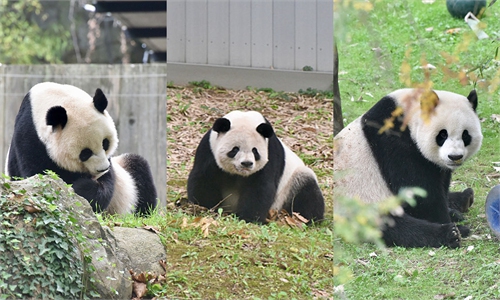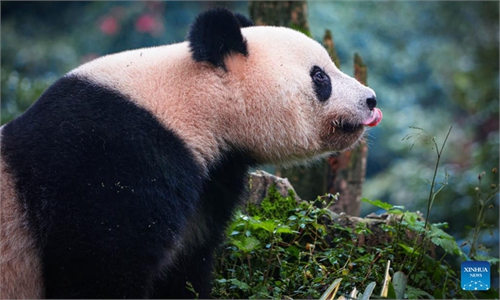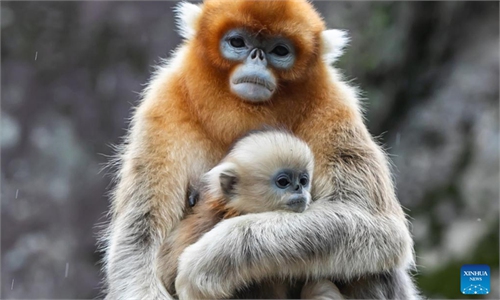63 Chinese giant pandas thriving abroad, demonstrating excellent health conditions: forestry authority

Giant panda twins You You and Jiu Jiu celebrate their second birthday on September 7, 2023, in Madrid, Spain. The Madrid Zoo is celebrating the twins' second birthday with special activities over the next two Saturdays. The twins weigh around 70 kilograms and both are fed about 30 kilograms of bamboo a day, completing their diet with milk. Photo: VCG
China is engaged in panda conservation cooperation and research with 19 countries, with a total of 63 pandas residing abroad, according to the latest release from the National Forestry and Grassland Administration. The assessment shows that the overall health of pandas living overseas is good, while the achievements of international cooperation in panda conservation are significant.
China is currently collaborating with 23 institutions from countries such as Japan, Austria, Spain, the UK, France, Singapore, Germany, Russia, and Qatar in panda conservation and research. On-site inspections and evaluations have shown that these foreign institutions generally meet the requirements in terms of panda enclosure construction, feeding and care and disease prevention and control measures, according to China's National Forestry and Grassland Administration, as reported by China Central Television (CCTV) on Tuesday.
The giant panda is a rare species unique to China. In order to protect the species together, China has been engaged in panda conservation cooperation and research with various countries and regions since the 1990s. The focus of these collaborations includes panda breeding, disease research and public education.
Countries collaborating with China in panda conservation have not only constructed high-standard facilities for breeding and exhibition but also established high-level teams for feeding, medical care and scientific research. They actively engage in conservation and scientific exchanges with China and receive high attention from their respective countries, as reported by CCTV.
International cooperation on panda conservation has played an important role in promoting the protection of the species and fostering friendly exchanges between China and other countries and regions. Many pandas residing in foreign countries are widely loved by local people, to the extent that many bid farewell to the pandas when they return to China.
In February, hundreds of Japanese fans, some in tears, waved toward a charter flight flying in the bright sky over Narita International Airport to bid farewell to hugely popular Xiang Xiang as she departed for her home country. The giant panda was originally scheduled to travel back to China by the end of December 2020, but her return was postponed multiple times due to her popularity in Japan and the COVID-19 pandemic.
Giant panda lovers in the US are bidding farewell to their beloved Mei Xiang and Tian Tian as well as their 3-year-old son Xiao Qi Ji, as they are scheduled to return home in China by December 7. To honor the adorable "diplomats," Washington's Smithsonian's National Zoo hosted a nine-day event earlier this month dedicated to letting their thousands of devoted fans see them one last time. With the zoo having housed eight giant pandas since 1972, the giant panda has become a symbol of Washington, along with the White House and the Capitol.
Earlier in March, the Chinese public expressed concern over the condition of giant panda Ya Ya at the Memphis Zoo in Tennessee, the US, which grew into a spontaneous "campaign" among Chinese people all around the world to check how pandas are surviving in overseas zoos. Ya Ya safely returned to China in April and her health visibly improved in the following months.
In September, the first giant panda college was established under China West Normal University in Southwest China's Sichuan Province, aiming to cultivate advanced professionals in the conservation of rare animals and plants.
Global Times



